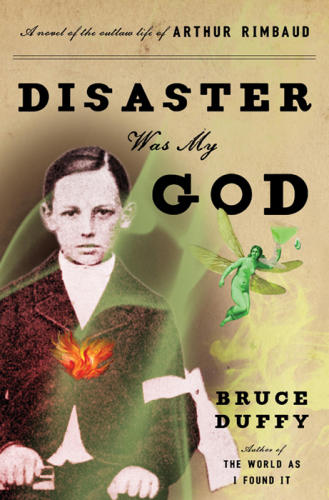
Disaster Was My God
A Novel of the Outlaw Life of Arthur Rimbaud
- اطلاعات
- نقد و بررسی
- دیدگاه کاربران
نقد و بررسی

April 11, 2011
Having already fictionalized the life of Ludwig Wittgenstein (The World as I Found It), Duffy now sets his sights on Arthur Rimbaud, who, as a teenager, caused a scandal in Paris with his decadent poetry and his affair with the older, married poet Paul Verlaine. But in 1873, at age 20, Rimbaud is through with Verlaine, poetry, and Paris, and announces his farewell in "A Season in Hell" before settling in Africa, where he becomes an arms merchant. A sickness forces him to return to France for treatment and a final confrontation with the overbearing mother he'd fled from 20 years earlier. Duffy recreates Rimbaud's absinthe-drenched life in Paris and imaginatively fills in the gaps of his later career in Africa, where the poet finds, to his chagrin, that his literary reputation in France has been enhanced by his absence. Duffy's Rimbaud is like a character created by Conrad after a long night spent in the company of the Green Fairy, but the conceit isn't helped by the author too often straining the reader's patience with sentences that try to out-Rimbaud Rimbaud, resulting in a strange but not unappealing mashup of Moulin Rouge and Heart of Darkness.

June 15, 2011
Based on the life of the 19th-century enfant terrible of French symbolist poetry, Arthur Rimbaud, Duffy's story opens up the poet's psychological depths, emotional torments and sexual proclivities.
The author alternates his narrative between vignettes of Rimbaud's early life—growing up in the French provinces with a domineering and monstrous mother—and the last year of his life, ill and traveling back to France from Abyssinia (now Ethiopia) to get treatment for his cancerous leg. The novelist introduces us to Rimbaud's early verse, received in enlightened and avant garde circles with both astonishment and éclat. We then learn of his move to Paris to meet (and for a while, live with) Paul Verlaine, whose 17-year-old wife on Rimbaud's arrival is about eight months pregnant. The two poets begin a tempestuous and scandalous affair that flies in the face of conventional morality. While there's plenty of dissipation to go around, Verlaine emerges as an even more debauched character than the younger poet, largely living on absinthe, wine, bitterness and envy. Their relationship climaxes in Verlaine's wounding of Rimbaud, and the latter's decision to give up poetry at the age of 20. The final journey Duffy chronicles is sad beyond belief, with the 37-year-old poet seeming about two decades older than his age, agonizingly making his way from Africa to France, hoping to reunite with his mother (who'll have none of it) and with a younger sister who doesn't even know he's a writer.
Because Duffy quotes Rimbaud's poetry generously, this novel serves as a good introduction to his life and work.
(COPYRIGHT (2011) KIRKUS REVIEWS/NIELSEN BUSINESS MEDIA, INC. ALL RIGHTS RESERVED.)

February 1, 2011
Not the biggest fiction on this list and not for the strictly commercial crowd, but I was genuinely enthralled by Duffy's The World as I Found It, a fictionalized life of Ludwig Wittgenstein, and am equally enthralled to learn that he's done something similar for Arthur Rimbaud. For your literary set.
Copyright 2011 Library Journal, LLC Used with permission.

July 1, 2011
Duffy portrayed philosopher Ludwig Wittgenstein in his extolled first novel, The World as I Found It (1987). In his second work of biographical fiction, Duffy takes on poet turned arms dealer Arthur Rimbaud. Patron saint for Patti Smith and Jim Morrison, the precocious French farm boy and rebel visionary scandalized Paris, radically transformed poetry as a teenager, put down his pen before turning 20, and instigated mayhem wherever he went. Infused with the wild energy and mystical images of Rimbaud's poems, Duffy's saturated novel veers between Rimbaud's galvanic escapades in France and his brutal last days in Africa as he crosses the desert to the sea delirious with pain, journeying home to die at 37. Duffy revels in his intense characters: brilliant and feral Rimbaud, his ogress of a mother and long-suffering sister, and, most sympathetically, absinthe-poisoned poet Paul Verlaine, who abandoned his young, pregnant wife for a doomed affair with scoundrel Rimbaud. Impassioned and melodramatic, keenly detailed and hallucinogenic, Duffy's reeling novel avidly encompasses the terror and beauty, despair and ecstasy of high-pitched lives and tradition-shattering art.(Reprinted with permission of Booklist, copyright 2011, American Library Association.)




دیدگاه کاربران